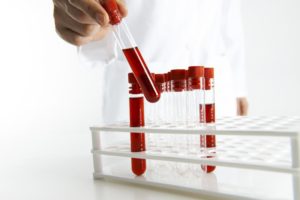 Follicle-stimulating hormone is a gonadotropin. This is a type of hormone that stimulates the gonads. The gonads are the ovaries in women and the testes in men.
Follicle-stimulating hormone is a gonadotropin. This is a type of hormone that stimulates the gonads. The gonads are the ovaries in women and the testes in men.
Follicle-stimulating hormone (FSH) is secreted from a small gland in the brain called the anterior pituitary.
This article explores what FSH levels are and how they may be tested for in relation to menopause and fertility.
Contents of this article:
Overview
Why is the FSH test performed?
What do FSH levels tell the doctor?
Risks and considerations for the FSH test
Outlook: What comes next?
Overview
In women, follicle-stimulating hormone helps to mature the ovarian follicles that release the eggs. Men’s bodies use FSH to support the growth and development of sperm.
Without the release of FSH, a woman cannot continue her reproductive cycle, as her ovaries will not release an egg.
FSH levels can be tested in both sexes to assess fertility, or to see if a woman is going through menopause.
Doctors can do a blood test to measure FSH levels. This is usually done alongside tests for other sex hormones, such as testosterone or estrogen.
Why is the FSH test performed?
Doctors often order the FSH test as part of a range of tests. There are a number of reasons to carry out the FSH test, including:
Menopause testing: If a woman’s menstrual cycle has become irregular or she has not had her period at all, a doctor may order the test. If FSH levels are high, it could indicate menopause.
Female fertility testing: If a woman is not ovulating, her FSH levels might be either high or low, depending on the cause.
Male fertility testing: In men, FSH stimulates the growth of sperm cells. If a man’s FSH levels are high, it can mean the testicles are not functioning properly.
In addition to testing for fertility and menopause, doctors may order an FSH test to look for a pituitary disorder, or to determine if a child is entering puberty too early or too late.
The U.S. Food and Drug Administration (FDA) have also approved a urine test that measures FSH levels. This test can be done at home. If a woman has difficulty conceiving, the test can show if she is in the early stages of menopause.
What do FSH levels tell the doctor?
FSH levels are usually just one part of the puzzle a doctor has to work out. To gain a clearer picture, further tests are likely to be needed. Examples include tests for:
estradiol
luteinizing hormone
progesterone
testosterone
Also, when testing for fertility, a doctor may ask a woman to track her temperature, as this can rise during ovulation. Similarly, they may order imaging scans to check the fallopian tubes. If the tubes are blocked, the woman’s egg cannot travel to the uterus for implantation.
According to The North American Menopause Society, if a woman has an FSH level of 30 milli-international units per milliliter (mIU/mL) or higher, and has not had a period for one year, she has probably reached menopause.
However, if a woman has a single FSH test with this result, it does not mean she has reached menopause. She will need multiple tests to establish this.
According to Mayo Medical Laboratories, the reference values (most typical values) for FSH are:
Males older than age 18: 1.0-18.0 International Units Per Liter (IU/L)
Postmenopausal women: 16.7-113.6 IU/L
In premenopausal women:
Follicular: 3.9-8.8 IU/L
Midcycle: 4.5-22.5 IU/L
Luteal: 1.8-5.1 IU/L
A doctor will provide a reference list for FSH testing results, so that someone can identify whether their levels are normal, low, or high. A doctor will explain the results and recommend treatments.
If a woman is in early menopause, a doctor may recommend hormone replacement therapy to reduce the associated symptoms.
Risks and considerations for the FSH test
The FSH test usually consists of a simple blood test. A small sample of blood is needed and the risks are minimal, so a person can return to their everyday activities afterward.
A doctor will not use the FSH test alone to determine if a woman is going through menopause, or to identify reasons for infertility.
One problem with hormone testing is that a person’s hormones fluctuate over the course of hours and days. So, a blood sample and testing it for hormones provides only a “snapshot” of their levels.
A diagnosis based on FSH levels alone might be inaccurate in the case of a woman. However, men are considered to have steadier hormone levels.
There are certain medications that can affect FSH levels. It is important for the individual to tell the doctor all the medications they are taking to prevent false readings. Examples of medicines that could increase FSH levels include:
cimetidine
clomiphene
digitalis
levodopa
Medicines that decrease FSH levels include:
hormone replacement therapies
oral contraceptives
phenothiazines
Taking multivitamins that contain biotin or vitamin B7 may also affect the accuracy of the FSH test. Doctors usually recommend a woman refrain from taking these supplements for at least 12 hours before a test.
Outlook: What comes next?
FSH tests can help a doctor evaluate fertility or menopause status.
For a woman, a doctor may recommend she has several blood samples drawn over the course of her menstrual cycle to see if her FSH levels are consistently high, low, or normal.
However, most women going through menopause will not require FSH testing.
If women are older than 45 the following symptoms alone are usually enough to confirm they are going through the menopause:
hot flashes
mood changes
difficulty sleeping
However, if a woman or a man is under 40 and wants to be tested for fertility concerns or early menopause, the FSH test can be an important in making a diagnosis.
Medical News Today JO.






